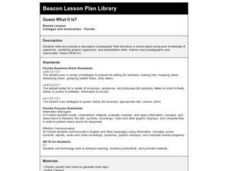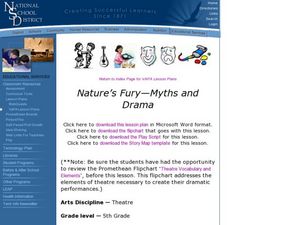Syracuse City School District
Literary Elements
Address the literary elements in a piece of writing using these materials. The packet includes plenty of resources, and focuses mainly on theme, character, and point of view, with some materials for setting, symbolism, and author's...
Curated OER
Lesson: Emory Douglas: Revolution in Our Time, Part 2
I love lessons like this because they let kids see the power of art, poetry, and activism in times of social injustice and unrest. They'll analyze the art used by Emory Douglas in the production of the Black Panther newspaper and...
Curated OER
Beautiful Noise Poetry
"What a beautiful noise comin' up from the street; got a beautiful sound, it's got a beautiful beat..." Use Neil Diamond's "Beautiful Noise" to guide your class through a Six Trait writing activity, in which they write an original poem...
Curated OER
Using Imagery in Poetry
Students examine the use of imagery in poetry. In this literature instructional activity, students read "Thought of Hanoi," by Nguyen Thi Vinhand use the provided graphic organizer to chart the poem imagery. Students then describe the...
Center for Civic Education
The Power of Nonviolence: The Children's March
What was the Children's Crusade and how did it impact the civil rights movement in the United States? Your young learners will learn about this incredible event through a variety of instructional activities, from reading a poem and...
Maryland Department of Education
The Concept of Diversity in World Literature Lesson 9: Debating Imperialism
To gain an understanding of Imperialism, class members read Rudyard Kipling's poem, "The White Man's Burden" and Mark Twain's essay, "To the Person Sitting in Darkness." Groups compare these perceptions of non-white cultures with the...
Alabama Department of Archives and History
W.E.B. DuBois, Booker T. Washington, and Jim Crow
Class members use the think-pair-share strategy to compare the views of W.E.B. Du Bois and Booker T. Washington and to consider how each man's backgrounds influenced his philosophy.
Curated OER
Calendar Clues Worksheet
In this birthday calendar worksheet, students look closely at a classroom birthday calendar and use the graphic organizer on the worksheet to analyze the data. Then students use the data to write a newspaper story, poem , or story.
Scholastic
Ready to Research Owls
Researching facts about owls can be a hoot for your class. Let them wisely collaborate on this writing project. The resource is the second part of three parts. It is best to use all three lessons in order.
Curated OER
Guess What It Is?
Third graders write and present a descriptive 'powergraph' that describes a secret object using prior knowledge of adjectives, clustering graphic organizers, and presentation skills. Authors read powergraphs and classmates 'Guess What It...
Curated OER
Barbie Girl: Gender Equity
Students examine gender bias and strategies to overcome it. In this gender equity instructional activity, students discuss what gender bias is, identify the presence of bias and discrimination and examine vocabulary that indicates the...
Curated OER
Omaha's Whose Who at Prospect Hill Cemetery
Students explore and are able to explain how to read an old street map of downtown Omaha. Students review the names of schools in OPS as well as country names in Nebraska. They find out the names of graves in Prospect Hill Cemetery....
Curated OER
Nature’s Fury—Myths and Drama
Fifth graders explore the elements of theatre. In this dramatic performances lesson plan, 5th graders discuss the structural elements of theatre and dramatize "The Origins of the Season," an explanation myth.














